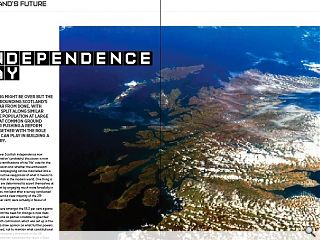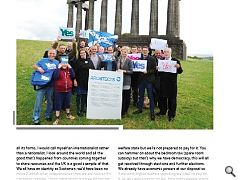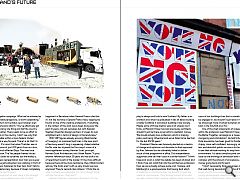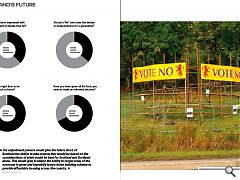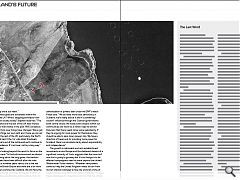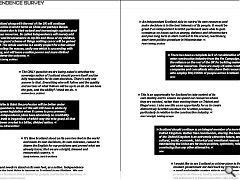Scotland's Future: Independence Nay
29 Oct 2014
Campaigning might be over but the debate surrounding Scotland’s future is far from done. With architects split along similar lines to the population at large we ask what common ground there is for pushing a reform agenda together with the role architects can play in building a new country.
With the debate over Scottish independence now settled for ‘a generation’ (probably) discussion is now turning toward the ramifications of the ‘No’ vote for the construction profession and whether the enthusiasm unleashed by the campaigning can be channelled into a positive and constructive reappraisal of what it means to be Scottish and British in the modern world. One thing is for sure architects are determined to assert themselves at this pivotal moment by engaging much more forcefully in the political process, not least after a survey conducted by Urban Realm found a clear majority of the 219 respondents (60 per cent) were actually in favour of independence.Whether you were amongst the 55.3 per cent against independence or not the need for change is now clear, a point lost on no-one as parties scrabble to give their support to the Smith commission which was set up in the wake of the vote to draw opinion on what further powers ought to be devolved, not to mention what constitutional changes might be necessary elsewhere in the UK.
One architect who has welcomed the result is Alan Dickson of Skye-based Rural Design who told Urban Realm; “I have an instinctive criticism of nationalism in all its forms, I would call myself an internationalist rather than a nationalist. I look around the world and all the good that’s happened from countries coming together to share resources and the UK is a good example of that. We all have an identity as Scotsmen; we’d have been no more Scottish after independence than we are now so it’s not about identity. I think nationalism is a wee bit narrow minded. By and large the UK has been a pretty successful endeavor for the past 300 years. There are times when it’s been better and times when it’s been worse but just because the Tories are in power doesn’t mean we should throw the baby out with the bathwater and split the nation.”
Commenting on the social justice push of pro-independence campaigners seeking to undermine the pro-Union Labour vote in the latter stages of campaigning Dickson added: “They say we’ll be like the Scandinavians, well Scandinavians have some of the highest personal taxes in Europe. We want this wonderful welfare state but we’re not prepared to pay for it. You can hammer on about the bedroom tax (spare room subsidy) but that’s why we have democracy, this will all get resolved through elections and further elections. We already have economic powers at our disposal so if we want higher welfare spending we need to pay for it, so let’s add a penny on tax. How many people would argue with that? These options are at our disposal at the moment but the politicians are scared to act.”
Of course the swing toward Yes evidenced by several shock polls in the lead up to the vote leaves some serious questions to be asked of the No campaign but Dickson isn’t too scathing: “It was hard for Better Together, calling for the status quo is difficult. The way the question is framed yes is such a positive word and no is so negative. It’s a hard job. In retrospect it might have been better to frame the question in a different way but I think we let the SNP do pretty much what they wanted. There’s been a failure to frame the positive side of the Union because it has been a negative campaign. What we’ve achieved as the UK, from a global perspective, is worth celebrating.”
Far from a return to the status quo however even Dickson now champions reform: “You’ve effectively got half the country doing one thing and half the country wanting to do another. There needs to be an effort to satisfy everybody in the country. I don’t see why that wouldn’t be possible within a more federal United Kingdom, there is a way forward. There’s a lot that I’m dissatisfied with. It’s ironic that when Thatcher was in power our local council, just 200 yards from our door, took decisions which affected Skye. That was local democracy in action. The Yes people framed this as taking decisions closer to ourselves but the reality is, for us, we have less representation now than we’ve ever had before. We’ve got policemen now walking in front of the office with guns holstered to their hips. Don’t talk to me about local democracy because it’s been completely destroyed over the last 10 years.
“From a creative point of view there is this thought that we’d have a new enlightenment with Scottish independence but I just don’t see it. Okay things happened in Barcelona when General Franco died but it’s not like we have a General Franco here, keeping his thumb on top of the creative professions. If anything, in the context of the work we’ve been doing over the past 10 years, not just ourselves but with Alasdair Stephen (Dualchas Design partner), it’s been its own enlightenment in terms of design in the landscape.”
With SNP figures already accusing Westminster of ‘reneging’ on promises fault lines in the new spirit of harmony weren’t long in appearing. Asked whether the No vote has stymied the Yes camp’s vision of a more egalitarian society Harman Scott, principal, Harman Scott Architecture, told Urban Realm: ”It puts another referendum back 20 years and has built a lot of resentment south of the border. It’ll be more difficult because there will be more resistance, they (Westminster) will say ‘the Scots aren’t with us why should we care anymore? They’re second class citizens.’ I think the no vote is actually unsustainable, it’s not as though things will stay the same… they won’t.”
Alasdair Stephen, organizer of Architects for Yes movement, added: “Architects have a unique role to play to design and build a new Scotland. My father is an architect and when he graduated it was all about building a better Scotland, it was about building a new society. Maybe some of those dreams were a bit utopian but I think, as Malcolm Fraser has said previously, architects shouldn’t just be there as servants to capitalist money. We should actually be a profession which is shaping policy and being influential and we’ve failed to be like that for the last 20/30 years.”
President Obama was famously elected on a mantra of change and optimism not dissimilar to that espoused by Alex Salmond but he ultimately failed to deliver much of that programme in office. Did independence supporters over sell their case in a similar fashion? “I think hope and vision is what the debate has been all about and I think if we can instill that into the architecture profession then we can actually achieve quite a lot. I believe, and Edinburgh is a good example, that having land which is traded as a commodity does not benefit or meet the needs of communities. Only through control of tax can we really address that. Likewise, welfare, when you’ve got policies like the bedroom tax which is affecting the end users of our buildings then that is something we should be engaged in, we shouldn’t just leave it to the politicians, we should get more involved ourselves like we used to do back in the 50s/60s and 70s.”
One of the chief proponents of independence from within the profession was Malcolm Fraser, who described the Better Together campaign as a ‘sewer of fear-mongering and intimidation’. He told Urban Realm: “I think devolution has been good for Scotland, we’re less chippy, more self-confident, less angry, demonise England less and demolish public services a bit less. I would like to see that attitude working its way through the built environment. It’s about simplicity and clarity. I’ve been close to the workings of devolution and it is unbelievably complex with the amount of procedures, protocols and money going back and forward.
“I don’t necessarily think we’ve been listened to all that well during devolution and some of the Scottish government’s procurement policies I’m on record as saying are absolutely dreadful but we’re not going to have that power in Westminster; there is no chance of that. Our people are listening to us in Holyrood and they’re next door to us. They are at our heart.”
But surely these goals are achievable within the framework of the UK? What’s stopping architects from building this new society today? Stephen observes: “The politics in Scotland and the rest of the UK have moved apart, there was that chance in the post 1945 consensus to do that but I think now things have changed. We’ve got to move on and forge our own path and I hope we can set an example for the rest of the UK, particularly the North of England.” But hasn’t the ‘no’ vote killed this dream dead? “The genie’s out of the bottle and we’ll continue to fight for independence. It’s not over, not by a long way,” Stephen remarked.
Fraser too is looking beyond the result to focus on the longer term. He said: “In the built environment we should be used to thinking about the long game, the medium term might indeed have been difficult after the vote. Look back from a hundred years hence, this is the last unraveling of the British Empire and there are a lot more economic powers coming into Scotland. We still have the ability to invade foreign countries and spend £100bn on Trident and create unsustainable bank bubbles, that will remain, but at some point that will be changed too.”
Conceding Dickson’s point in relation to the centralization of powers seen under the SNP’s watch Fraser said: “We do need more local democracy in Scotland, we’re really bad at it and it’s something I couldn’t influence through the Scottish governments town centre review. We need active citizens within our communities and we all as a nation need to remind Holyrood that there needs to be some subsidiarity. If they’re arguing for more power for themselves they should be able to pass down powers too. We have a direction of travel and its providing more power for Scotland, there’s an absolute clarity about responsibility and independence.”
The growth in nationalist and anti-establishment movements across Europe and the shattered dreams of a significant minority of Scots suggests that the issue isn’t one that is going to go away but if true change is to be effected campaigners need to move beyond the clichéd Westminster Tories rhetoric . Whatever new powers come our way the United Kingdom needs to turn from its own internal wrangles to face the world at a time of acute financial uncertainty and global instability. To meet these challenges it is imperative not only that the United Kingdom remain united – but that Scotland should remain so too.
|
|
Read next: Gray's School of Art: Gray's Matters
Read previous: Doors Open Day: Don't Knock It
Back to October 2014
Browse Features Archive
Search
News
For more news from the industry visit our News section.
Features & Reports
For more information from the industry visit our Features & Reports section.


